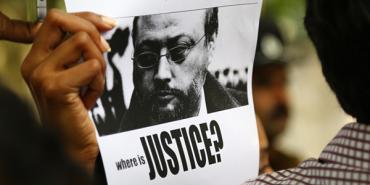When journalists are assassinated and labor and human rights flagrantly violated, the AFT stands up for justice no matter where the violations occur. In this spirit, the executive council passed two resolutions Feb. 6 signaling its ongoing commitment to freedom, democracy and justice in the Middle East and Brazil.
In one resolution, the AFT calls on members of Congress to hold Crown Prince Mohammed bin Salman of Saudi Arabia accountable for the “abhorrent and unjustified murder” of Washington Post journalist Jamal Khashoggi. In another resolution, it condemns the attack on labor and democracy being carried out by newly elected Brazilian President Jair Bolsonaro and pledges support for those who oppose his “anti-democratic record and human rights abuses.”
The murder of Khashoggi, who was “savagely killed at the hands of Saudi Arabian security forces in the Saudi consulate” in Istanbul in October, was itself a brutal act, and the “chilling effect” it had on journalists amplified its impact. “In his writings, Khashoggi had called attention to the extreme authoritarian behavior of the Saudi Arabian royal family and government, which operates far beyond international norms and standards for human rights and the rule of law, including the fact that Saudi Arabia severely restricts freedoms of expression, association and assembly,” the AFT resolution reads. It goes on to protest lengthy prison terms and unfair trials experienced by human rights defenders and critics in Saudi Arabia, and condemns the death by beheading of 14 young men convicted there for peaceful civil disobedience. The resolution also condemns the war Saudi Arabia is waging in Yemen, where innocent civilians are being killed, including 40 children on a school bus who died during an airstrike.
The AFT pledges to communicate its opposition to members of Congress, embassies and corporations that do business in the region, urging them to withhold participation in Saudi Arabia’s plan for political and economic expansion.
In Brazil, the newly elected Bolsonaro administration has rolled back human rights, workers’ rights, political freedoms, minority rights and environmental protection. Recent changes in labor law have “eliminated important trade union and workers’ rights, cut off sources of union financing and significantly increased precarious employment,” the second resolution says. Thousands of public sector workers have been fired. And the education system has been targeted for drastic change, including eliminating sex education, requiring that creationism be taught alongside evolution, and encouraging teachers and students to report “leftism” in the classroom.
The Brazil resolution resolves to work with Education International and Public Services International to continue street actions, social media campaigns and demonstrations to call attention to the anti-democratic record and human rights abuses of the Bolsonaro administration, and to support those who are fighting against authoritarianism in that country.
[Virginia Myers]

